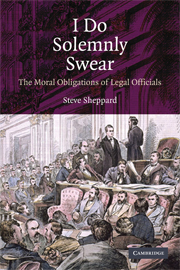Book contents
- Frontmatter
- Contents
- Preface: Moral Officials, Retail Justice, and Three Caveats
- Acknowledgments
- Introduction: Seven Questions about What Is Fit for an Official to Do
- 1 Law and Office
- 2 The Stakes: The Interests of Others in Official Actions
- 3 Officials' Obligations Arise from More Than the Law Alone
- 4 The Moral Obligations of Legal Officials
- 5 Patterns of Relationship between Legal and Moral Obligations
- 6 Breaching Obligations
- 7 Tools for the Trade: Maxims and Fallacies
- Epilogue: What the Official Ought to Do: Law and Justice
- Appendix: Taxonomy of Headings: The Lawes and Libertyes of Massachusetts (Discussed in Chapter 1)
- Index
- References
5 - Patterns of Relationship between Legal and Moral Obligations
Published online by Cambridge University Press: 05 June 2012
- Frontmatter
- Contents
- Preface: Moral Officials, Retail Justice, and Three Caveats
- Acknowledgments
- Introduction: Seven Questions about What Is Fit for an Official to Do
- 1 Law and Office
- 2 The Stakes: The Interests of Others in Official Actions
- 3 Officials' Obligations Arise from More Than the Law Alone
- 4 The Moral Obligations of Legal Officials
- 5 Patterns of Relationship between Legal and Moral Obligations
- 6 Breaching Obligations
- 7 Tools for the Trade: Maxims and Fallacies
- Epilogue: What the Official Ought to Do: Law and Justice
- Appendix: Taxonomy of Headings: The Lawes and Libertyes of Massachusetts (Discussed in Chapter 1)
- Index
- References
Summary
Thus it is the error of men who are not strictly upright to seize upon something that seems to be expedient and straightway to dissociate that from the question of moral right. To this error the assassin's dagger, the poisoned cup, the forged wills owe their origin; this gives rise to theft, embezzlement of public funds, exploitation and plundering of provincials and citizens; this engenders also the lust for excessive wealth, for despotic power, and finally for making oneself king even in the midst of a free people; and anything more atrocious or repulsive than such a passion cannot be conceived. For with a false perspective they see the material rewards but not the punishment – I do not mean the penalty of the law, which they often escape, but the heaviest penalty of all, their own demoralization.
Cicero, On Duties, Book III, Chapter VIIIf the obligations for an official to act are derived from both legal and nonlegal sources, then there will be at least some recurring patterns of interaction among the resulting obligations. This interaction sometimes presents an official with choices, particularly when different obligations would require inconsistent conduct. Any given choice can be quite complex, resulting from a variety of reasons or instincts that apply in varying degrees. The interplay among these obligations could be so diverse that a complete analysis of any given action might not be meaningful, but the interplay may still be examined, to some extent, by considering the relationships among obligations for an official to act, when some of those reasons arise from law and some from morality.
- Type
- Chapter
- Information
- I Do Solemnly SwearThe Moral Obligations of Legal Officials, pp. 179 - 202Publisher: Cambridge University PressPrint publication year: 2009



